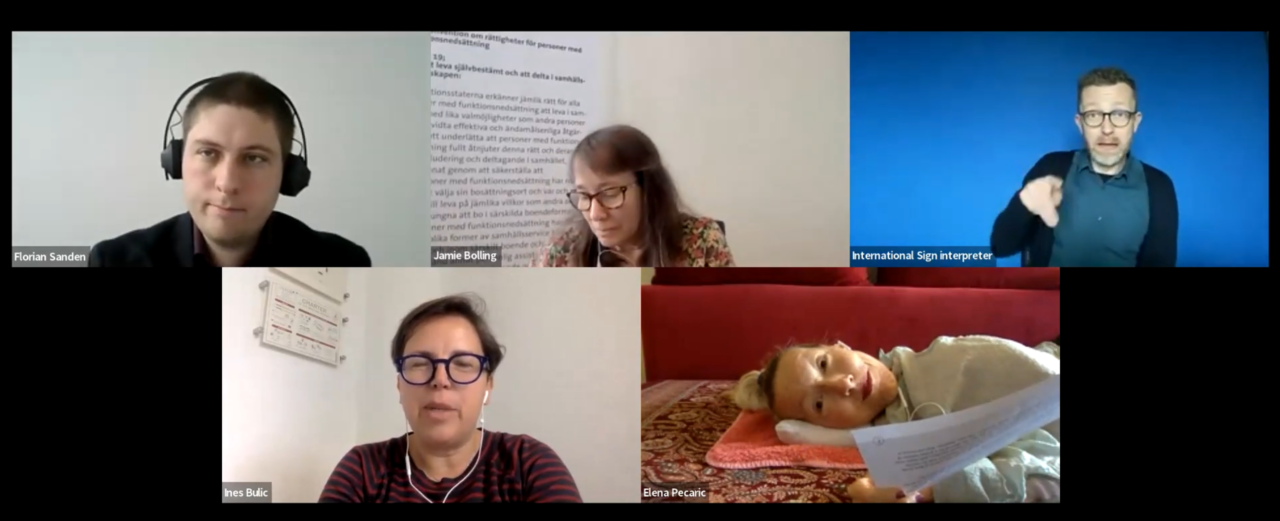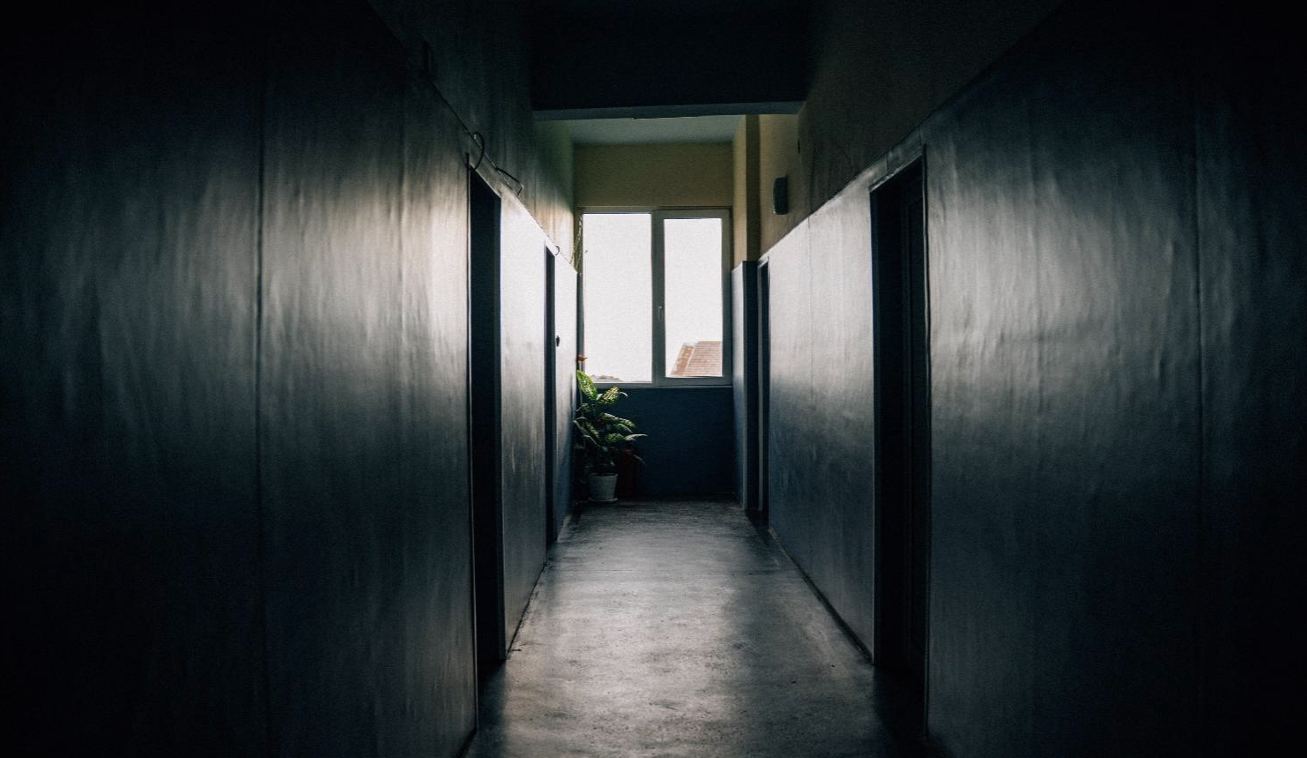On May 5th, the Independent Living Day, ENIL presented the results of its second Independent Living Survey to its members, representatives of civil society organisations and policy makers from the European Commission and the European Parliament. You can read summaries of the speaker´s remarks below, download the presentations or watch the events´ recording.
On the 5th of May, we celebrated the Independent Living Day. For ENIL, this was an excellent occasion to launch the results of our second Independent Living Survey, a research project which was conducted between 2020 and 2022. In the course of the project, 143 respondents answered questions about access to Independent Living in general and 75 questions about access to personal assistance in particular. The launch event took place in the form of a webinar. Ten speakers, staff members and volunteers of ENIL, disability activists from around Europe and policy makers from the European Commission and the European Parliaments participated and presented their views on the results of the ENIL Independent Living Survey.
“The number of PA-schemes and recipients are increasing but there are serious concerns regarding quality”
Florian Sanden, Policy Coordinator and Nina Portolan, member of the ENIL Youth Board and the former European Solidarity Corps volunteer at ENIL worked on the survey together and thus presented key results. According to Nina and Florian, there are some good news. The number of countries in the Council of Europe area which have publicly funded personal assistance schemes (PA) has increased. Within the EU, Luxembourg remains as the only country which does not even have a pilot project on introducing a PA scheme. Also, the number of PA recipients has increased. On the other hand, there are many problems with the PA schemes that have been introduced. Respondents from 33 countries rated their countries´ personal assistance as inadequate or requiring improvement, indicating severe problems when it comes to quality. A large majority of countries, 29 (85%), limit the number of assistance hours per user, making it impossible to get 24/7 support. Such rules leave disabled people with high support needs without assistance and might force them to live in institutions.
The presentation held by Florian and Nina is available under the following link.
“In 2008 the German government introduced the personal budget and the principle that the funding should follow the beneficiary. Today, institutions and sheltered work-shops still receive the largest part of the funding”
Uwe Frevert, co-chair of Interessenvertretung Selbstbestimmt Leben, one of our organisational members from Germany, explained that in 2008 the government introduced the personal budget as means to improve choice, control and self-determination for disabled people. With it, “the money follows the person principle” was introduced, meaning that the resources to finance support services are transferred to the disabled person, not institutions or service providers. In turn, the disabled person is free to purchase services as needed. Especially people with intellectual disabilities have so far only received support when living in an institution. According to Uwe, the personal budget did not fully produce the changes one had hoped for. Funding authorities are spending EUR 8,3 billion annually to support disabled people living in special housing and only EUR 3 billion to support disabled people living in regular apartments. Likewise, 3.048 disabled people were receiving funding for meaningful work outside and 276 204 for work inside sheltered workshops.
You can download Uwes´ presentation here.
“After our 50th anniversary conference and a presentation by Adolf Ratzka, the Maltese government started a reform of our PA-scheme, involving MFOPD and ENIL as stakeholders”
Marthese Mulette of the Maltese Federation of Organisation of persons with disabilities (MFOPD), outlined a positive development regarding the reform of personal assistance in Malta. According to Maltese, the first personal assistance scheme was introduced in 2012. For MFOPD the new service did not count as PA since it did not support choice and self-determination. The service was unknown and only benefited a small number of persons. The type of support offered resembled care work rather than personal assistance. MFOPD tried to communicate to policy makers and the public the difference between the two service but it was a slow process. The turning point came in April 2022, when at the conference to celebrate the 50th anniversary of MFOPD, Adolf Ratzka gave a presentation about personal assistance in the presence of the national service provider and the minister for inclusion. The national service provider began working on a reform and involved MFOPD and ENIL. The preparations for this reform are continuing. MFOPD and ENIL are involved in the process together with Agencia Support, the directorate for disability issues and the Commission on the Rights of Persons with Disabilities.
“The Polish government is preparing a PA law not in line with the UNCRPD and without consulting Disabled People. We will keep protesting”
Lukasz Orylski, disability activist from Poland, explained that developments in his country were not inclined to create the same optimism. The ministerial programme on PA in force since 2020 was unavailable in small towns and rural areas. Last year president Duda had promised on law on personal assistance. The new legislation was under preparation but without the consultation of PA recipients or disability organisations. The law was being prepared by academics, for example sociologists. Until today his organisation had not access to the draft law. In a meeting with the ministry for family affairs a couple of slides revealed some key information which showed that the upcoming regulation was not in line with the UNCRPD. Each PA user would receive 100 hrs of service monthly, irrespective of need. People under 18 were excluded and during the year the service provision is scheduled to take breaks for several months, during summer and Christmas time.
“When applying for PA at ULOBA an advisor with assistance needs her- or himself will guide you”
Martine Eliasson, political advisor at ULOBA, Independent Living Norge SA from Norway, presented the work of her organisation. Being a PA-recipient cooperative, ULOBA is a provider of personal assistance services which is governed democratically by its membership, consisting exclusively of disabled people. Basing all of its activities on the lived experience of disabled people, the organisation follows the rule that at least 50% of the administrative staff must be disabled and all PA advisors have assistance needs themselves. The personal assistance ULOBA was providing, was following the Independent Living principles. Recipients were recruiting and training their own assistants but receive training in PA management. Recipients were deciding who they wanted to assist them, what they were being assisted with, where they were being assisted and when they wanted assistance. At the moment there were 3969 PA recipients in Norway. Between 2015 and 2021 the number had increased by 988 people. A reason for the slow increase was to be seen in quality problems resulting from the low amounts of hours usually granted by the municipalities in charge of implementing PA. ULOBA was advocating for the PA-scheme to be administrated at the state level.
“Since 2012 the number of PA recipients has decreased in Sweden. In 2026 we are expecting a new law which will centralise provision and improve portability”
Jamie Bolling, board member of ENIL, presented the work of the PA-recipient cooperative STIL, the Founders of Independent Living Sweden, of which she is a member. Sweden had been one of the first countries to introduce a personal assistance scheme. Since 2012 the number of people who are PA-recipients had been going down from 20.000 to 15.000. The funding for PA was provided in the form of a direct payment which gave recipients the ability to decide whether they wanted the municipality, a company or a cooperative was to provide the service. PA wages in Sweden were competitive. The recipients received EUR 30 per hours, 17 of which went to the assistant. The rest was needed for insurance, administration and additional cots such as having PA support during vacations and funding for entry tickets to events. At the moment a new EU directive which will limit working time to 13hrs per day per person was creating problems. By 2000 Sweden had closed all large institutions but built more small group homes instead. With the decrease in usage of PA there was a risk for reinistitutionalisation. By 2026 a reform of the PA law was coming into effect. The new law would centralise PA at the state level. While this was creating some insecurity about the continuation of services, there were also advantages. With the new centralisation in place, PA recipients would finally be able to move freely between municipalities. At the moment reapplication at the new place of residence was the only way to keep your personal assistance.
“Personal assistance is intended to allow disabled people to be active members of society. In Slovenia our PA-scheme is not implemented with this understanding in mind. Old concepts of care and protection remain”
Elena Pecaric, from YHD Slovenia, explained personal assistance in Slovenia had departed from the intent of the Personal Assistance Act in 2019 in practice. PA was a service allowing individuals to become active members of society. After the introduction of PA no change in the understanding of the concept had taken place. The old concept of care and protection was being implemented under a new name. The application process was often abused. Playing the role of a helpless disabled person could lead to a higher numer of PA hours. Since there are no complementary services, PA was often awarded to compensate for social hardships. At the moment Slovenia lacked a range of services in the community to support people who are not entitled to PA. Personal assistance should only be granted to socially active disabled people with a large range of needs. Users should be active and responsible with a proven permanent disability after completing treatment or rehabilitation.
“For the European Commission it is important to hear from stakeholders to inform the upcoming Guidance on Independent Living. It will be based on co-production and the UNCRPD”
Olga Martinez- de Briones, Policy Officer for disability affairs at the European Commission, reacted to the presentations. For the Commission it was important to hear from stakeholders to inform the upcoming Guidance on Independent Living. Independent Living and personal assistance required systemic changes in the approach. The presentations had showed the importance of person-centred services for the transition to community-based services, the milestones, challenges and misunderstandings and also the importance of co-production. The Commission tried to always listen to and co-produce with stakeholders and implement the partnership principle. The speakers had also presented good examples from member states. The Commission was working for the inclusion of persons with disabilities. The European Strategy on the Rights of Persons with Disabilities was covering many areas. The employment package had been launched last year and there was accessible EU. The right to Independent Living was being advanced through two flagship initiatives. The Guidance to Independent Living was to be published this year, the framework for Social Services of Excellence in the next. It would be based on General Comment No 5 and the Guidelines on Deinstitutionalisation.
“For me deinstitutionalisation and autonomy for Disabled People are a priority. It is incredible we still have to fight for that in the year 2023.”
Anne-Sophie Pelletiter, Member of the European Parliament (MEP) from France and rapporteur of the resolution “towards equal rights for persons with disabilities”, thanked the presentation, saying the event was a job well done. MEP Pelletier explained that she used to be a care worker who had experienced how difficult it is to support it is to support persons with disabilities to be independent under current conditions. For her deinstitutionalisation and autonomy for disabled people were priorities. Persons with disabilities should finally be able to have personal lifes. It was incredible we still had to fight for that in 2023. The EU should also adopt the European Disability Card and allow card holders the same services across borders. The EU needed an effective system of monitoring the use of funds. The suspension, withdrawl and recovery in case of misuse should be practiced more often. At the moment we were often unaware were resources were going. The Parliament and the Commission should pressure the member states to do more on disability rights.



